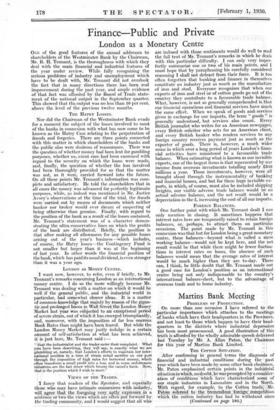VIEWS OF THE TRADES.
I fancy that readers of the. Spectator, and especially those who may have intimate connexions with industry, will agree that the foregoing very aptly expresses in a sentence or two the views which are often put forward by the trading community, and I would suggest that all who are imbued with those sentiments would do well to read the full text of Mr. Tennant's remarks in which he deals with this particular difficulty. I can only very imper- fectly summarize one or two of his main points, and I must hope that by paraphrasing his carefully considered reasoning I shall not detract from their force. It is too often forgotten that banking and finance in themselves constitute an industry just as much as the manufacture of iron and steel. Everyone recognizes that when our exports of iron and steel or of cotton goods go out of the country they contribute to a favourable trade balance. What, however, is- not so generally comprehended is that our financial operations and financial services have much the -same effect. When we speak of goods and services given in exchange for our imports, the term " goods '? is generally understood, but services also count. Every British journalist who writes for an American newspaper, every British solicitor •who acts for an American client, and every British banker who renders services to any foreign country receives payment just as much as the exporter of goods. There is, however, a much wider sense in which over a long period of years London's finan- cial activities have ministered to a favourable trade balance. When estimating whatis known as our invisible exports, one of the largest items is that represented by our income from overseas investments totalling nearly £300 millions a year. Those investments, however, were all brought about through the instrumentality of banking and financial houses, and but for these huge invisible ex- ports, in which, of course, must also be included shipping freights, our visible adverse trade balance would be an actual adverse balance, and the net result would be a depreciation in the £, increasing the cost of all our imports.






































 Previous page
Previous page